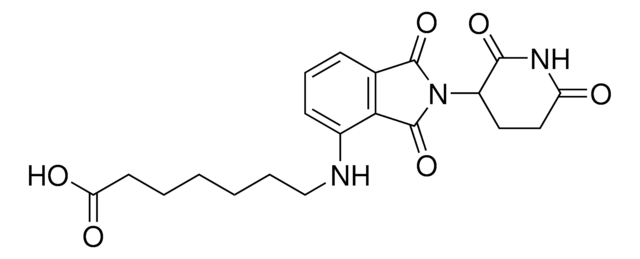902683
BocNH-PEG5-acid
Synonym(s):
2,2-Dimethyl-4-oxo-3,8,11,14,17,20-hexaoxa-5-azadocosan-22-oic acid, Boc-NH-PEG5-CH2COOH
Sign Into View Organizational & Contract Pricing
All Photos(1)
About This Item
Empirical Formula (Hill Notation):
C17H33NO9
CAS Number:
Molecular Weight:
395.45
UNSPSC Code:
12352106
NACRES:
NA.22
Recommended Products
form
liquid
reaction suitability
reaction type: Pegylations
reagent type: cross-linking reagent
functional group
Boc
amine
carboxylic acid
storage temp.
−20°C
SMILES string
OC(COCCOCCOCCOCCOCCNC(OC(C)(C)C)=O)=O
Application
This heterobifunctional, PEGylated crosslinker features a carboxylic acid at one end and Boc-protected amino group at the other, which can be deprotected with mildly acidic conditions. The hydrophilic PEG linker facilitates solubility in biological applications. BocNH-PEG5-acid can be used for bioconjugation or as a building block for synthesis of small molecules, conjugates of small molecules and/or biomolecules, or other tool compounds for chemical biology and medicinal chemistry that require ligation. Examples of applications include its synthetic incorporation into antibody-drug conjugates or proteolysis-targeting chimeras (PROTAC® molecules) for targeted protein degradation.
Technology Spotlight: Degrader Building Blocks for Targeted Protein Degradation
Technology Spotlight: Degrader Building Blocks for Targeted Protein Degradation
Legal Information
PROTAC is a registered trademark of Arvinas Operations, Inc., and is used under license
related product
Product No.
Description
Pricing
Storage Class Code
10 - Combustible liquids
WGK
WGK 3
Flash Point(F)
Not applicable
Flash Point(C)
Not applicable
Choose from one of the most recent versions:
Certificates of Analysis (COA)
Lot/Batch Number
Sorry, we don't have COAs for this product available online at this time.
If you need assistance, please contact Customer Support.
Already Own This Product?
Find documentation for the products that you have recently purchased in the Document Library.
Miyuki Mabuchi et al.
Bioorganic & medicinal chemistry letters, 25(16), 3373-3377 (2015-06-24)
This Letter presents an effective method for the identification of target proteins of bioactive compounds such as drugs, natural products, and intrinsic ligands, using an affinity resin. The application of a photo-labile linker to an affinity resin enabled the selective
Our team of scientists has experience in all areas of research including Life Science, Material Science, Chemical Synthesis, Chromatography, Analytical and many others.
Contact Technical Service








